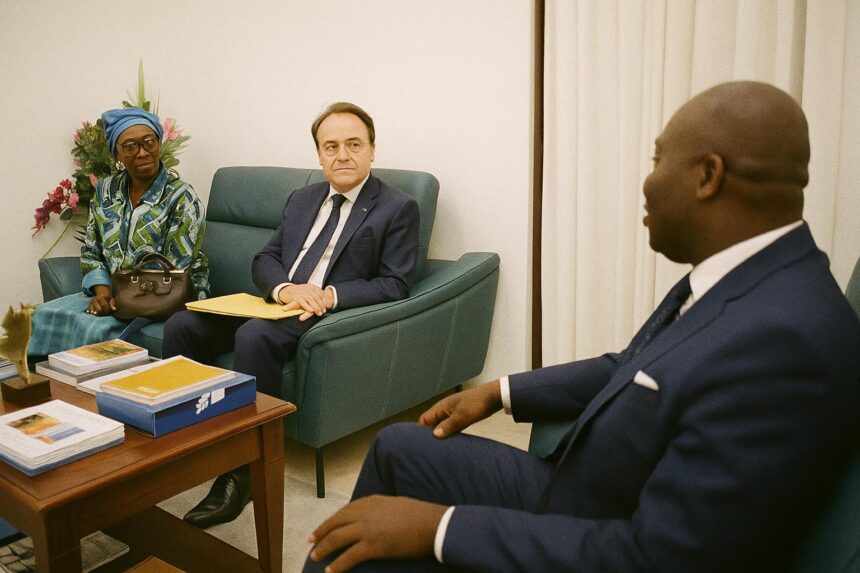Rome’s New African Equation
When Italian Prime Minister Giorgia Meloni unveiled the Mattei Plan earlier this year, analysts noted a deliberate pivot from conventional energy diplomacy toward entrepreneurship. The initiative, named after ENI founder Enrico Mattei, now gets its first laboratory in Congo-Brazzaville, a choice framed in Rome as pragmatic and symbolic (Italian MFA communique).
Italian ambassador Enrico Nunziata reiterated that symbolism in Brazzaville on 22 July, stressing that the pilot offers Italy a way to couple historical cultural ties with present-day economic opportunity. His remarks suggested a long-term commitment rather than a fleeting grant cycle, underscoring what he called “shared interests in resilient growth”.
Why Brazzaville Matters
Congo’s selection surprised some observers who expected a larger market such as Nigeria. Yet Brazzaville offers a captive French-speaking corridor, relative political stability and transport links to Gulf of Guinea ports. These factors allow rapid proof-of-concept trials without the noise of a crowded venture scene (African Development Bank brief).
Minister of Posts, Telecommunications and the Digital Economy Léon Juste Ibombo framed the pilot as an accelerator of the national “Silicon Heartland” vision. Government advisers note that a smaller but agile jurisdiction could showcase quick wins, burnishing both Congolese and Italian credentials before the model scales continent-wide.
Blueprint for Half-Million Ventures
Rome’s roadmap sets an ambitious headline: catalyse up to 500,000 African start-ups within a decade. For Congo, the immediate target is a few hundred high-impact firms in healthtech, precision agriculture and logistics. Mentorship, seed capital and regulatory coaching feature prominently in the memorandum signed on 19 June.
Italian agencies will coordinate with the Congolese digital incubator network and regional institutions such as ECCAS. Officials hint at blended finance structures mobilising EU guarantees, private equity and diaspora remittances. The design borrows from Italy’s own SME clusters in Emilia-Romagna, but adapts governance to Central African realities.
Training the Digital Generation
Beyond capital, the plan rests on human capital. University-industry programmes will pair Congolese engineering faculties with Politecnico di Milano and Bologna Business School. Short-term boot camps in Brazzaville and Pointe-Noire will focus on coding, product design and regulatory compliance, areas investors cite as deal-breakers (Bloom Consulting survey).
Youth groups greeted the July announcement with cautious optimism. “We need skills before money,” said Denise Malonga, founder of a local agri-drone start-up. Italian partners appear mindful; an initial tranche of scholarships covers 120 Congolese students in mechatronics and data science, with return-to-country clauses to mitigate brain drain.
Financing Beyond the Big Four
Current African venture flows still gravitate to Egypt, Nigeria, South Africa and Kenya, absorbing over 80 percent of disclosed funding in 2023 (Partech report). By spotlighting Congo, Italy aims to diversify that geography and test whether well-structured deals can unlock capital in smaller markets.
Local banks like BGFI Congo and Crédit du Congo intend to create thematic funds co-anchored by Italy’s CDP. Analysts argue that such vehicles must offer local-currency tranches to shield founders from forex volatility. Nunziata indicated that the embassy’s economic section will convene quarterly risk-sharing roundtables with insurers and multilaterals.
Diplomacy, Energy and Soft Power
Although the Mattei Plan emphasises entrepreneurship, it dovetails with Rome’s broader energy engagement. ENI remains a significant offshore operator in Congolese waters, and stable host institutions serve both start-ups and hydrocarbons. Italian officials maintain, however, that the pilot is not a camouflage for upstream concessions.
For Brazzaville, the partnership reinforces a diplomatic track record of multi-vector engagement—balancing long-standing French and Chinese ties with newer Southern European overtures. President Denis Sassou Nguesso has often advocated for what he calls “cooperative pragmatism,” a doctrine the Mattei pilot appears to affirm without stirring geopolitical friction.
Challenges and Early Metrics
Execution risks persist. Congo’s World Bank Doing Business indicators highlight hurdles in contract enforcement and electricity reliability. Italian technical teams propose modular solar micro-grids for incubators to sidestep power cuts, while a digital one-stop shop for company registration is scheduled to go live by year-end.
Success indicators include patent filings, gender balance among founders and follow-on investment leveraged independently of Rome’s stimulus. A joint monitoring unit housed at Congo’s Ministry of Planning will publish semi-annual dashboards. Transparency provisions were requested by civil-society observers and accepted by both governments, hoping to pre-empt doubts about impact.
Regional Ripples
If the pilot meets its milestones, Cameroon and Gabon are slated as the next recipients, according to sources close to Italy’s Africa Desk. ECCAS officials envision a cross-border sandbox allowing start-ups to trial products in multiple regulatory environments, enhancing scale and resilience.
For now, Brazzaville enjoys first-mover status. The opportunity aligns with national agendas on youth employment and digital public services. International donors view the scheme as complementary rather than competitive, and the African Union’s Innovation Fund is reportedly assessing co-financing possibilities for continent-wide expansion (AU communiqué).






















